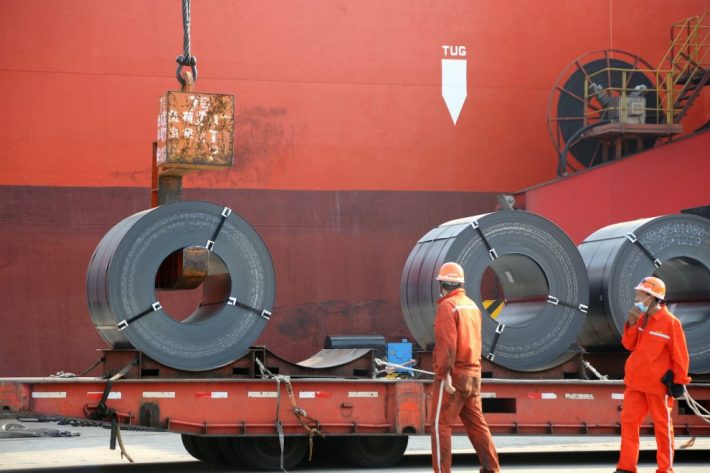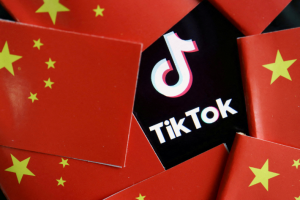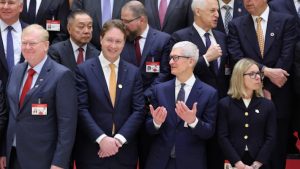Official data released on Friday showed that China’s industrial profits plunged nearly 18% in August – their biggest decline this year.
The slump added to a series of weak recent business outcomes that point to mounting pressure on the economy, and that explains why the Politburo supported strong stimulus measures this week.
Profits plunged 17.8% in August from a year earlier following a 4.1% increase in July, according to the National Bureau of Statistics (NBS), while earnings rose at slower 0.5% pace in the first eight months compared with 3.6% growth in the January-July period.
ALSO SEE: China Set to Issue $284bn in Special Bonds to Lift Economy
The slump in August was due to factors such as “the lack of effective market demand, the greater impact of natural disasters such as high temperatures, heavy rains, and floods in some areas,” NBS statistician Wei Ning said.
A high statistical base last year also magnified the reversal, with falling profits in the automobile and equipment manufacturing industries weighing on the outcome, Zhou Maohua, a macroeconomic researcher at China Everbright Bank, said.
A sluggish run of data earlier this month has exacerbated worries about an anaemic recovery, prompting global brokerages to revise down their 2024 China growth forecasts to below the official target of around 5%.
Highlighting weak domestic demand, a key bottleneck for the economy amid job security anxiety and worsening slumps in property sales and investment, domestic dairy giant Inner Mongolia Yili Industrial Group Co posted a 40% fall in second-quarter net profit.
“Domestic consumer demand remains weak while the external environment is complex and changeable,” the NBS’ Wei said.
To pump some much-needed optimism into the economy, China’s central bank announced on Tuesday the most aggressive stimulus since the pandemic, including a 50-basis-point cut on banks’ reserve requirements.
But analysts warned more demand-side easing, especially fiscal help, would be vital to restore confidence.
Chinese leaders on Thursday vowed “necessary fiscal spending” to hit this year’s economic growth target.
China plans to issue $284 bln of sovereign debt this year as part of a fresh fiscal stimulus, with part of the proceeds raised via special bonds used to provide a monthly allowance of $114 per child to all households with two or more children, excluding the first child.
State-owned firms saw profits down 1.3% in January-August, foreign firms recorded a 6.9% rise, while private-sector companies posted a 2.6% increase, a breakdown of NBS data showed.
Industrial profit numbers cover firms with annual revenues of at least 20 million yuan ($2.83 million) from their main operations.
Contraction also likely in September: Poll
Meanwhile, a Reuters poll of economists found that China’s factory activity likely remained in contraction for the fifth consecutive month in September, as weak domestic demand and rising global trade barriers continue to dog the world’s second-largest economy.
A Reuters poll of 22 economists estimated the official purchasing managers’ index (PMI) will come at 49.5, higher than August’s reading of 49.1, but below the 50-point threshold that separates growth from contraction in activity.
The mood in the manufacturing sector has been depressed for months by tumbling producer prices and dwindling orders.
In an unusual Politburo meeting focused on macroeconomic issues this week, China’s top leaders acknowledged the economy was facing “new problems” and called for fresh policies to more “forcefully” stimulate growth.
The meeting also urged efforts to stop the declines in the beleaguered property market and to deploy “necessary” fiscal spending.
- Reuters with additional editing by Jim Pollard
NOTE: Further text was added to this report and the headline amended on Sept 27, 2024.
ALSO SEE:
China Set to Issue $284bn in Special Bonds to Lift Economy
China Central Bank Stimulus Moves ‘Broad But Underwhelming’
China’s PBOC Cuts Short-Term Rate, to Discuss Outlook Tuesday
US May Sanction China’s DRAM Chip Giants Next, Analyst Warns
Big US Banks Cut China Growth Outlook Amid Industrial Slowdown
China’s Local Governments Slow to Act on Property Crisis
China to Use Bonds to Pay For Consumer Trade-in Scheme
























